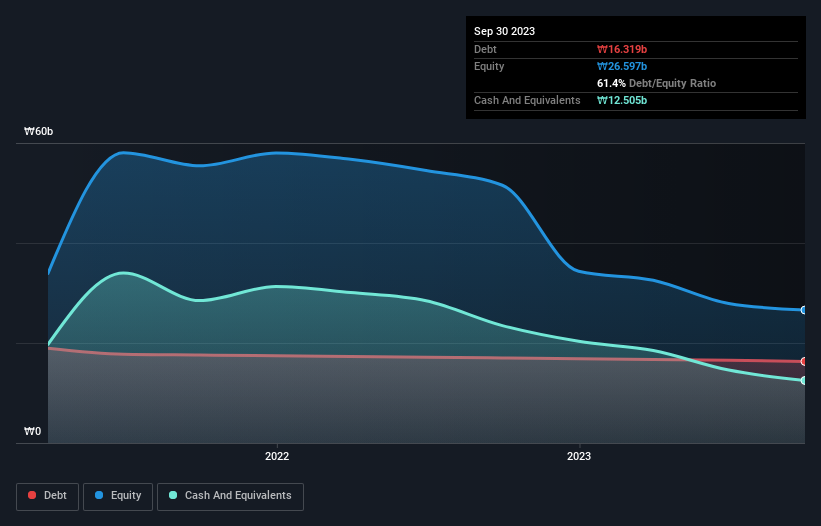
Legendary fund manager Li Lu (who Charlie Munger backed) once said, 'The biggest investment risk is not the volatility of prices, but whether you will suffer a permanent loss of capital.' When we think about how risky a company is, we always like to look at its use of debt, since debt overload can lead to ruin. We note that Jeju Beer Company, Limited (KOSDAQ:276730) does have debt on its balance sheet. But should shareholders be worried about its use of debt?
When Is Debt A Problem?
Debt assists a business until the business has trouble paying it off, either with new capital or with free cash flow. Ultimately, if the company can't fulfill its legal obligations to repay debt, shareholders could walk away with nothing. However, a more usual (but still expensive) situation is where a company must dilute shareholders at a cheap share price simply to get debt under control. Of course, plenty of companies use debt to fund growth, without any negative consequences. The first thing to do when considering how much debt a business uses is to look at its cash and debt together.
View our latest analysis for Jeju Beer Company
What Is Jeju Beer Company's Debt?
As you can see below, Jeju Beer Company had ₩16.3b of debt at September 2023, down from ₩17.0b a year prior. However, because it has a cash reserve of ₩12.5b, its net debt is less, at about ₩3.81b.

How Strong Is Jeju Beer Company's Balance Sheet?
According to the last reported balance sheet, Jeju Beer Company had liabilities of ₩26.1b due within 12 months, and liabilities of ₩2.90b due beyond 12 months. On the other hand, it had cash of ₩12.5b and ₩2.58b worth of receivables due within a year. So its liabilities total ₩13.9b more than the combination of its cash and short-term receivables.
Jeju Beer Company has a market capitalization of ₩61.7b, so it could very likely raise cash to ameliorate its balance sheet, if the need arose. But it's clear that we should definitely closely examine whether it can manage its debt without dilution. The balance sheet is clearly the area to focus on when you are analysing debt. But it is Jeju Beer Company's earnings that will influence how the balance sheet holds up in the future. So if you're keen to discover more about its earnings, it might be worth checking out this graph of its long term earnings trend.
Over 12 months, Jeju Beer Company made a loss at the EBIT level, and saw its revenue drop to ₩22b, which is a fall of 20%. We would much prefer see growth.
Caveat Emptor
Not only did Jeju Beer Company's revenue slip over the last twelve months, but it also produced negative earnings before interest and tax (EBIT). Its EBIT loss was a whopping ₩14b. When we look at that and recall the liabilities on its balance sheet, relative to cash, it seems unwise to us for the company to have any debt. So we think its balance sheet is a little strained, though not beyond repair. However, it doesn't help that it burned through ₩8.0b of cash over the last year. So suffice it to say we consider the stock very risky. There's no doubt that we learn most about debt from the balance sheet. However, not all investment risk resides within the balance sheet - far from it. We've identified 2 warning signs with Jeju Beer Company (at least 1 which is a bit unpleasant) , and understanding them should be part of your investment process.
When all is said and done, sometimes its easier to focus on companies that don't even need debt. Readers can access a list of growth stocks with zero net debt 100% free, right now.
Valuation is complex, but we're here to simplify it.
Discover if HanWool & Jeju might be undervalued or overvalued with our detailed analysis, featuring fair value estimates, potential risks, dividends, insider trades, and its financial condition.
Access Free AnalysisHave feedback on this article? Concerned about the content? Get in touch with us directly. Alternatively, email editorial-team (at) simplywallst.com.
This article by Simply Wall St is general in nature. We provide commentary based on historical data and analyst forecasts only using an unbiased methodology and our articles are not intended to be financial advice. It does not constitute a recommendation to buy or sell any stock, and does not take account of your objectives, or your financial situation. We aim to bring you long-term focused analysis driven by fundamental data. Note that our analysis may not factor in the latest price-sensitive company announcements or qualitative material. Simply Wall St has no position in any stocks mentioned.
About KOSDAQ:A276730
HanWool & Jeju
Engages in the manufacture of alcoholic beverages in South Korea.
Flawless balance sheet low.
Market Insights
Community Narratives



